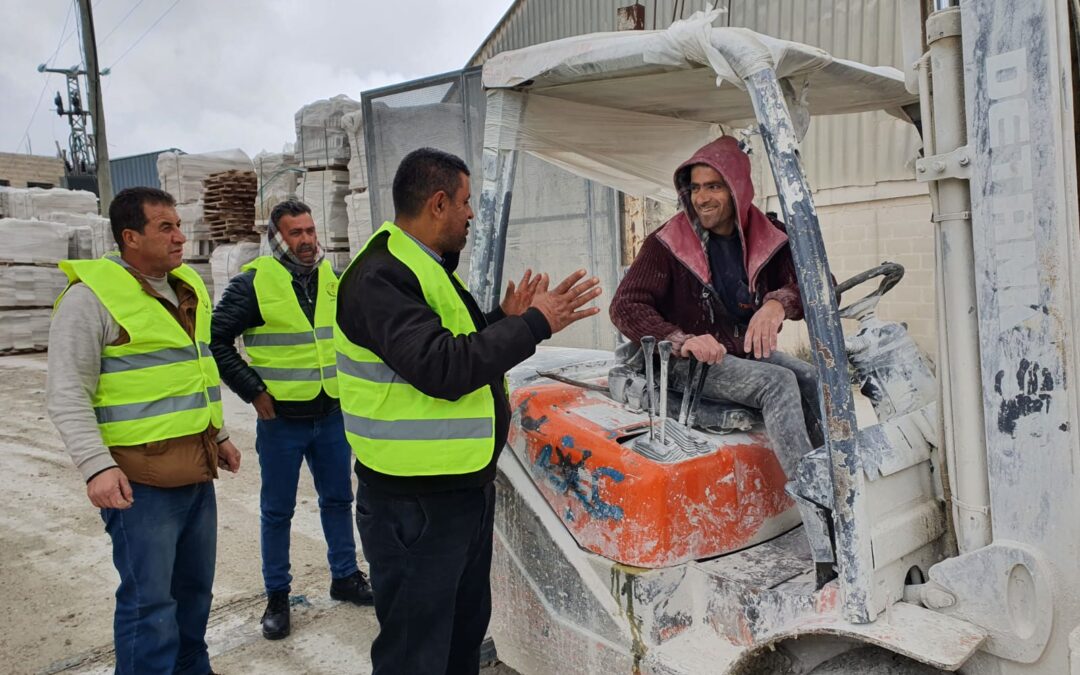
Jun 21, 2023
After successfully pushing for a higher minimum wage in Palestine, unions now are campaigning to ensure the new law is enforced—and employers pay workers what they are owed.
A key part of the process is first determining the prevalence of underpayment. Through Solidarity Center support, the Youth and Campaign Committees of the Palestinian General Federation of Trade Unions (PGFTU) and the Palestine Journalists Syndicate conducted a survey of workers in low-wage jobs such as those in kindergartens, private schools, agriculture, textiles and media.
The survey found more than 62 percent of workers do not receive the minimum wage, a contrast to government assertions that 86 percent of workers are paid the new wage.
Sameer Abu Libdeh, 31, an education service worker from Qalqilya City, is paid $485 per month, and says the minimum wage law “unfortunately it is not enforced.
“Our demand is to get paid the minimum wage, which is 1,880 shekels ($520). We just want one official to show up and do justice to the poor [people] who get paid 1,700 shekels ($470). 1,700 is not enough. I talk like this due to the injustice I see among my colleagues.”
Hard-Fought Victory to Raise Minimum Wage
PGFTU spearheaded a successful campaign for a minimum wage boost, effective in January 2022, that for the first time in years enables workers to earn above poverty-level wages.
The victory to raise the minimum wage was hard fought, says Mohammad Badri, a telecom worker, union activist and executive member of the PGFTU, the umbrella federation for unions across the West Bank and Gaza.
“The employers are very greedy. They did not commit to this resolution and they don’t want to give higher salaries to their workers,” says Badri, who described PGFTU’s successful campaign last year on The Solidarity Center Podcast.
Going forward, the union will discuss the survey results with civil society organizations and build alliances around the minimum wage campaign to increase pressure on government and employers to enforce the minimum wage.
With Solidarity Center support, the PGFTU also is connecting with journalists to put a human face on the struggles of low-wage workers. The union signed a strategic partnership agreement with the Journalists Syndicate to increase media coverage of PGFTU’s campaigns, including the minimum wage.
“So far, most media coverage is static. I mean it often focuses on numbers, statistics, ratios,” says Ayham Abu Ghosh, a journalist in Ramallah City at the Economic Journalist Network. “It is the time now to go beyond numbers, to humanize minimum wage issues by focusing and telling the personal stories of those underpaid workers.”
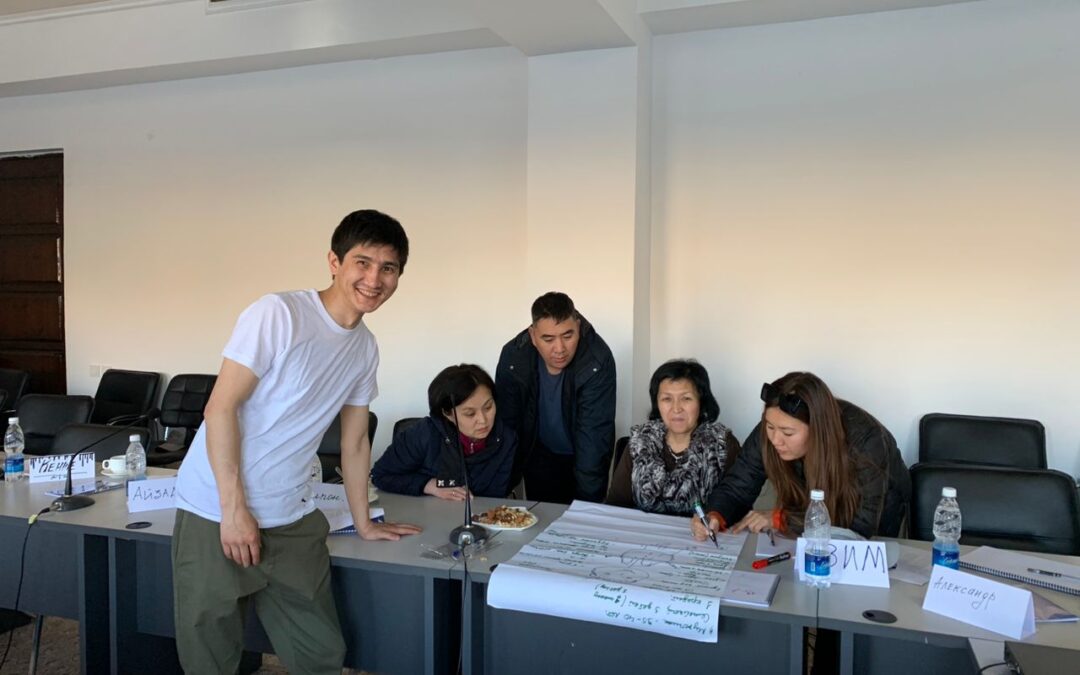
Jun 20, 2023
Recognizing that increased numbers help unions better advocate for worker rights and negotiate wages and working conditions with Kyrgyzstan’s employers and government, 28 union activists joined the Solidarity Center’s Organizing School, a four-part program that began in March. The school drew participants from construction, informal trading, public service, taxi and textile sectors, many of whom are already successfully putting their new skills into practice.
“By emphasizing practical skills, fostering authentic communication and providing ongoing support, this initiative is contributing to a stronger labor movement and empowered organizers who can bring about positive change in their workplaces and communities,” says Solidarity Center Program Officer Elena Rubtsova.
Early successes of the program include establishment of a union savings’ program, “Zymyryk-Invest,” by the union representing construction workers, which has already attracted dozens of new members, and expansion of the taxi drivers’ union, Kabylan, into Kyrgyzstan’s fourth largest city, Karakol, through use of a new, dedicated WhatsApp chat group. Although Kyrgyzstan’s labor law does not specifically protect the rights of workers on digital platforms, it allows self-employed taxi drivers to unite within pre-existing trade unions.
Between training sessions, organizing school participants practiced their new skills, including strategic communications, and benefited from group and Solidarity Center support.
“This training helped me understand that speaking from the heart and using our own words resonates more effectively with others,” says Kabylan President Ulan Cholponbaev.
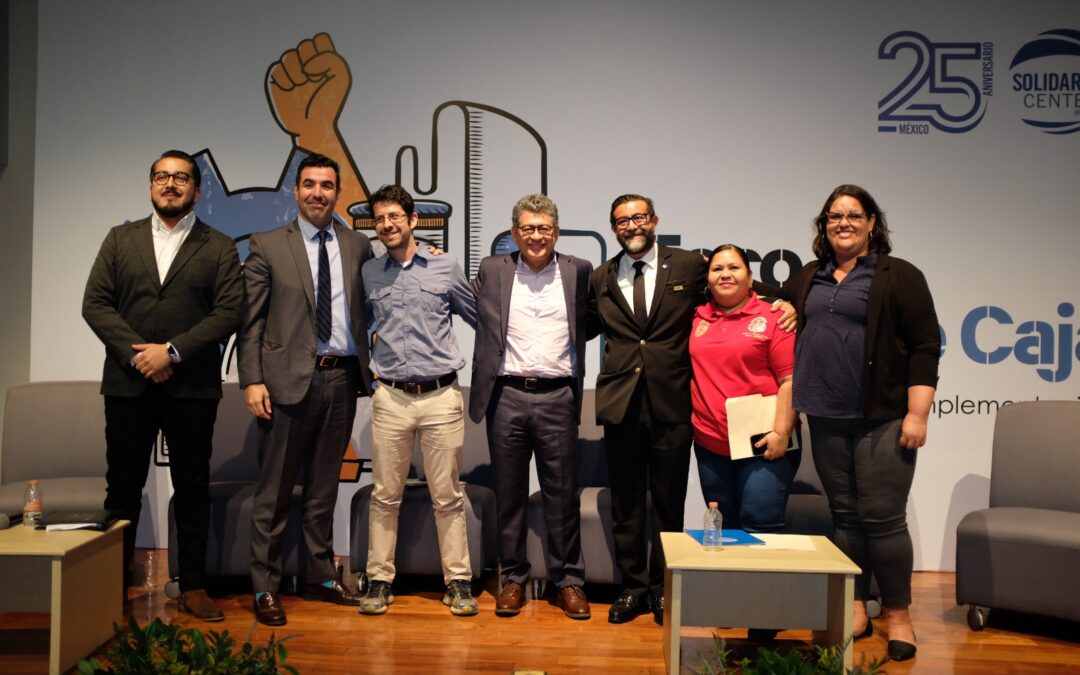
Jun 15, 2023
A quarter century since joining the fight for worker rights in Mexico, the Solidarity Center celebrated the progress made amid reflections on the historic moment workers and their allies face in the country.
“The most important and promising independent union organizing in the world is happening right here, right now in Mexico,” Shawna Bader-Blau, Solidarity Center executive director, told those gathered in Mexico City for the anniversary celebration.
To mark the occasion, the Solidarity Center organized a week of activities to honor the work of partners from the independent Mexican trade union movement, strengthen transnational solidarity, examine the challenges that lie ahead and build a path toward a more just Mexico. From May 29 to June 1, trade union leaders and workers from across the country joined scholars and activists from Mexico and the United States, as well as representatives from both countries’ governments, to continue the collective work to ensure that recent labor law reforms and trade agreements put workers’ interests at the forefront.
After three years of historic change since the reforms, the emergence of a new generation of labor leaders demonstrates that Mexican workers hold it within themselves to build an inclusive and responsive labor movement. The Solidarity Center proudly recognized their achievements.
“It’s an honor to join together with so many brothers and sisters, with so many organizations that just a year ago did not exist and who are now working to strengthen freedom of association and collective bargaining in Mexico,” said Paolo Marinaro, Mexico country program director, speaking to allies as he introduced an international forum on the labor reforms held during the week.
Over its 25 years of work in Mexico, the Solidarity Center has supported grassroots organizing and lifted authentic worker voices to help dismantle a system that for too long ignored the plight of workers and catered to the interests of the rich and powerful. Today, more so than any time in the country’s history, the Mexican labor movement represents the full spectrum of Mexican workers. Over the course of the week, the diversity of Mexico’s new labor leaders did not go unnoticed.
“The Solidarity Center is honored to work with young workers, women-led unions, emerging and established democratic leadership, organizations formed by migrant and indigenous workers, and others who are revitalizing the Mexican labor movement and inspiring the global labor movement,” Bader-Blau said.
Mexico’s new and more representative labor unions have won path-breaking victories that have inspired a new wave of labor organizing in the country. With Solidarity Center support, in just the last year over 20,000 Mexican workers have negotiated strong contracts with historic wage increases and workplace protections. From St. Gobain workers in Cuautla, Morelos, to 3M workers in San Luis Potosí, the new independent labor movement continues to bring tangible benefits to a workforce long held in check through collusion between employers, the government and corrupt unions.
Despite these important victories, the promise of the labor reforms has not been fully realized. For that reason, the Solidarity Center begins its 26th year in Mexico committed to helping Mexican workers build the power necessary to create a more just economy and a more prosperous country.
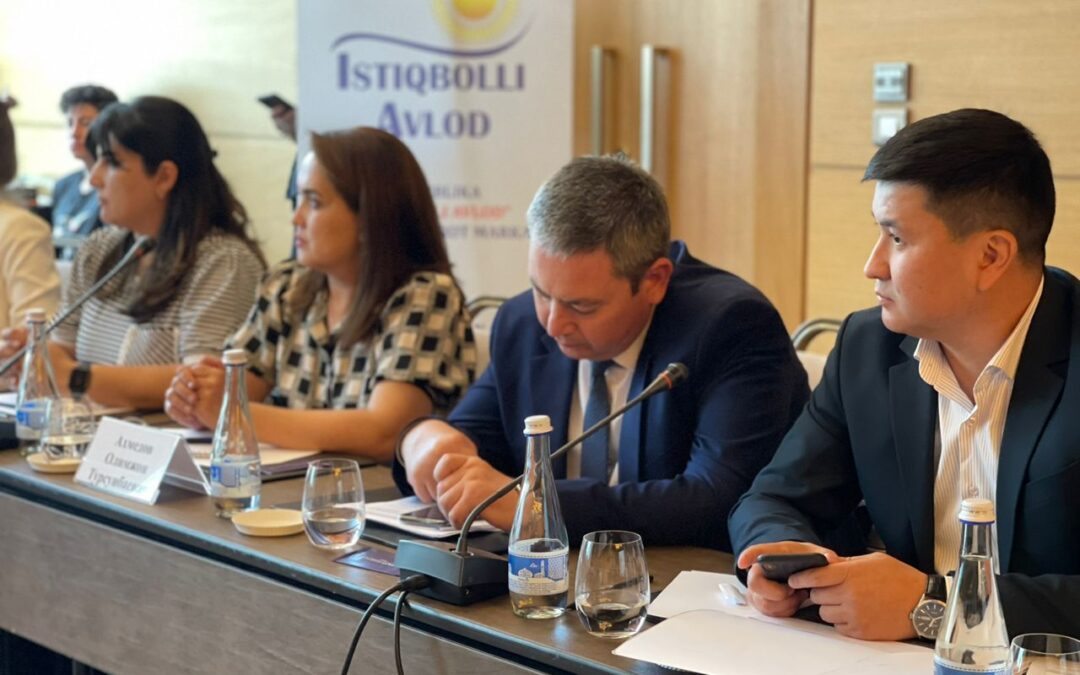
May 26, 2023
A milestone convening in Tashkent last week brought together stakeholders from Kazakhstan, Kyrgyzstan and Uzbekistan government ministries and agencies, non-governmental and civil society sectors, and international organizations as a first step in developing a joint action plan to combat forced labor and advance worker rights in the region. Worldwide, 28 million people were reportedly trapped in forced labor in 2021.
The May 22 conference highlighted labor inspectorates’ role in protecting worker rights and combating forced labor in the region. Solidarity Center supported the event, which was organized in collaboration with “Partnership in Action,” an international NGO network of more than 30 Central Asian organizations, Kyrgyzstan’s Migrant Workers Union’s partner organization “Insan-Leylek” and Uzbekistan’s Istiqbolli Avlod.
“There is a crucial need for regional cooperation in labor inspections, because migration patterns are constantly changing,” says “Insan-Leylek” leader Gulnara Derbisheva.
Recognizing the importance of collective action, the conference hosts provided a forum for representatives of labor inspectorates from Kazakhstan, Kyrgyzstan and Uzbekistan to share their expertise and experiences within their respective countries. Government representatives from each of those countries reiterated their commitment to labor inspectorates working cooperatively with one another and with the region’s worker rights defenders to fight labor exploitation and promote safer working environments and dignified work for all.
Topics included international standards related to the work of inspectorates, issues surrounding forced labor in Central Asia and the importance of labor inspections given the region’s unique challenges. Participants identified a severe shortage of labor inspectors—Solidarity Center research finds that 250 labor inspectors oversee 280,000 legal entities employing 6.5 million people in Kazakhstan, 30 inspectors oversee thousands of enterprises in Kyrgyzstan and 315 inspectors oversee 578,000 registered entities in Uzbekistan—and discussed restrictions on inspectorates’ effectiveness. Although the International Labor Organization (ILO) standards specify that inspections be conducted without prior notification, all three countries require prior consent and advance notice for inspections and exclude small businesses from inspection mandates. Kyrgyzstan and Uzbekistan are currently considering legislative changes to rectify such loopholes.
“The outcomes of the conference have the potential to transform labor protection, ensuring safer and fairer working conditions for everyone in the region,” says Solidarity Center Europe and Central Asia Regional Program Director Rudy Porter.
According to ILO data, some 2.3 million women and men around the world succumb to work-related accidents or diseases every year, including 340 million victims of occupational accidents and 160 million victims of work-related illnesses. The ILO reports 11,0000 fatal occupational accidents annually in the 12-member states comprising the Commonwealth of Independent States—Azerbaijan, Armenia, Belarus, Georgia, Kazakhstan, Kyrgyzstan, Moldova, Russia, Tajikistan, Turkmenistan and Uzbekistan—but points to “gross underreporting” of occupational accidents and diseases in the region.
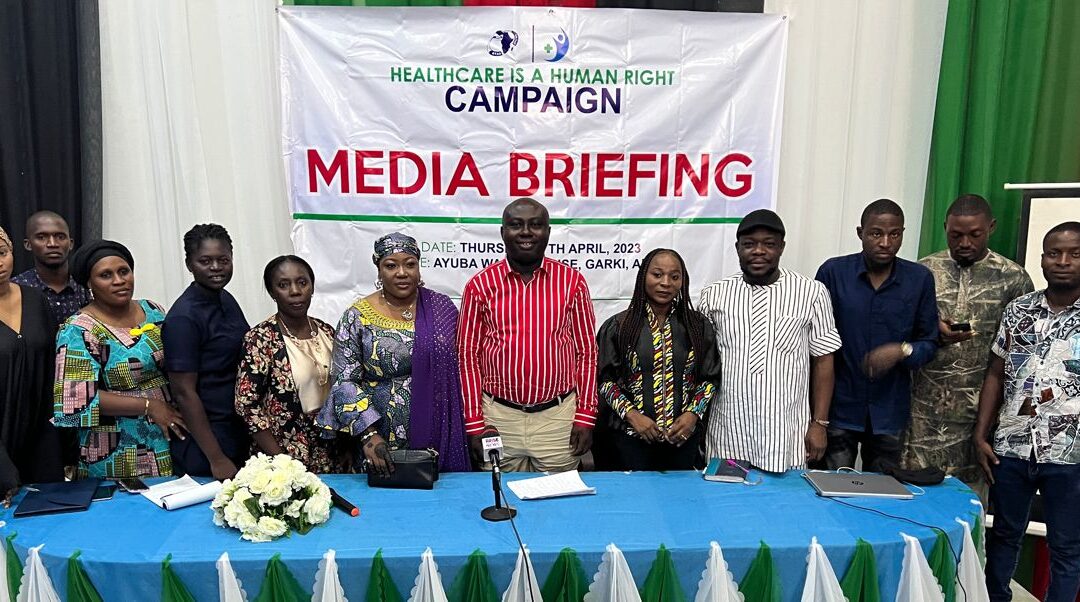
May 11, 2023
The Nigerian working group of a campaign led by the Organization of Trade Unions of West Africa (OTUWA) is collaborating on a regional campaign demanding more investment by governments in the health of their citizens. OTUWA represents trade union national centers in the 15 West African countries comprising the Economic Community of West African States (ECOWAS).
Addressing journalists at a public event in Abuja, Nigeria working group coordinator Dr. Ayegba Ojonugwa, last month warned that governments must increase health workers’ wages and improve their working conditions—including safety—to staunch the outflux of health workers from the beleaguered sector.
“We are here today to further advocate that health care is a human right,” said Ojonugwa, who noted that West Africa’s governments are not implementing the 15 percent minimum annual budgetary health allocation to which African heads of state agreed in the landmark 2001 Abuja Declaration. Currently, no country in the region achieves this percentage and Nigeria’s health care indicators are some of the worst in Africa—in part because medical professionals are in such short supply there.
In Nigeria, OTUWA’s “Health Care Is a Human Right” campaign—launched in Abuja in March 2021—is supported by the International Federation of Women Lawyers (FIDA), the Medical and Health Workers Union of Nigeria (MHWUN), the National Association of Nigeria Nurses and Midwives (NANNM) and labor federations Nigeria Labor Congress (NLC) and Trade Union Congress of Nigeria (TUC).
In the region, the campaign is supported by OTUWA’s affiliates together with many of their health sector unions. A 2020 survey of 700 health workers living in Gambia, Ghana, Nigeria, Senegal, Sierra Leone and Togo provides a window into the region’s health-sector shortcomings and presents a raft of recommendations for ensuring the protection of health worker rights and effective, accessible health care for all.
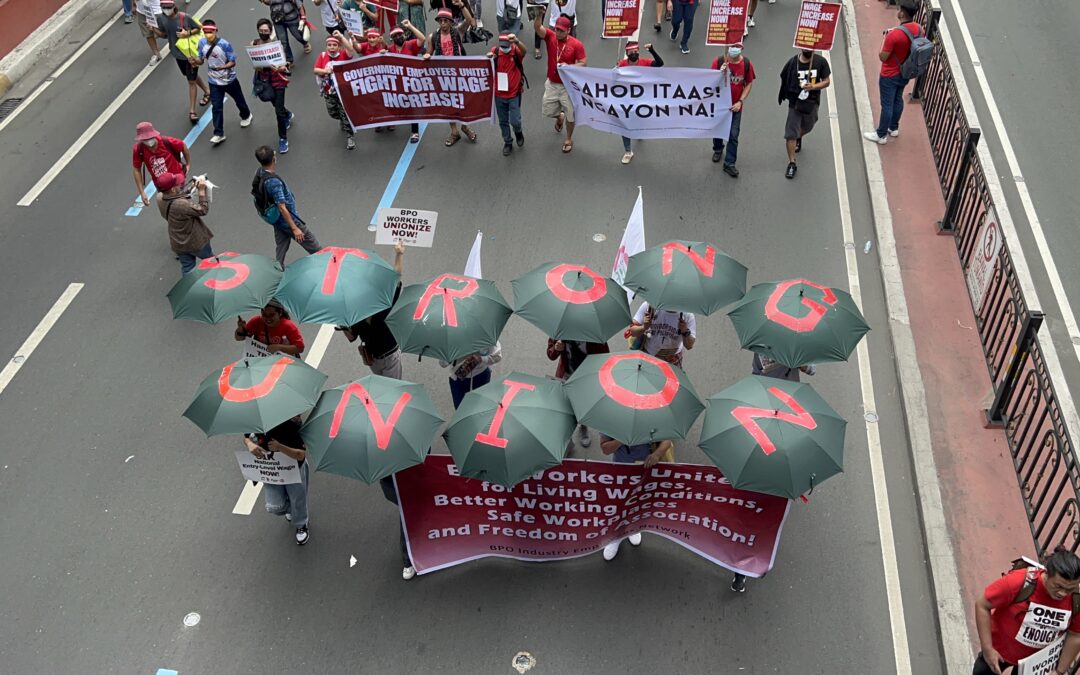
May 8, 2023
From Bangladesh to Kyrgyzstan, Mexico and Sri Lanka, hundreds of thousands of workers and their families celebrated International Workers Day May 1, honoring the dignity of work and the accomplishments of the union movement in defending human rights, job stability, fair wages and safe workplaces. For workers in Philippines, the event took on special importance, as they mourned and protested the recent stabbing and murder of Alex Dolorosa, a BIEN paralegal and officer organizing BPO workers in Bacolod, vowing to continue his work.
Click here for our photo essay of May Day 2023 events by Solidarity Center allies around the globe.






